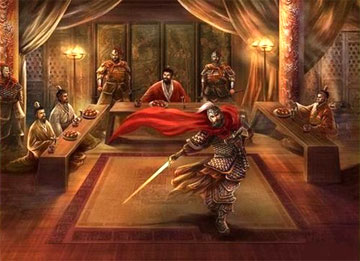Chinese Tuesdays: Hongmen Yan (鸿门宴)

鸿门宴 (Hóngményàn) was a banquet that took place in 206 BC. It's a long story, and one that everyone in China knows, but the short version is a rebel leader called Xiang Yu (项羽 Xiàng Yǔ) tried to have his rival Liu Bang (刘邦 Liú Bāng) killed at a feast. Liu Bang escaped, however, and eventually defeated Xiang Yu in battle to become the first emperor of the Han Dynasty.
Now the phrase has come to mean a ruse intended to trap a guest. If a rival or someone you don’t like or trust invites you out to dinner, for example, you could joke, “Is this a 鸿门宴?”
There a couple of other handy idioms that also originate from this event:
• 项庄舞剑,意在沛公 (Xiàng Zhuāng wǔjiàn, yìzài Pèi Gōng) translates as “Xiang Zhuang performs the sword dance, but his mind is set on the Duke of Pei [Liu Bang].” It refers to the plot during the feast in which Xiang Zhuang, a relative of Xiang Yu, performed a sword dance in order to get close to Liu Bang and kill him – a plan eventually foiled by another relative, Xiang Bo. The idiom now means to disguise an attack on another person in an cunning or elaborate way.
• 人为刀俎,我为鱼肉 (rénwéidāozǔ, wǒwéiyúròu) literally means “They are the knife and the cutting board, we are the fish and the meat.” These are the words supposedly said to Liu Bang by his allies to convince him to leave the banquet. Now it is used as a metaphor that someone’s life and death is in another person’s hands, or that you are at somebody else's mercy.
*
From Sam Duncan's blog 汉语小发现

















